| .circleci | ||
| .github | ||
| build | ||
| contrib | ||
| doc | ||
| examples | ||
| lib | ||
| programs | ||
| tests | ||
| zlibWrapper | ||
| .buckconfig | ||
| .buckversion | ||
| .cirrus.yml | ||
| .gitattributes | ||
| .gitignore | ||
| .travis.yml | ||
| appveyor.yml | ||
| CHANGELOG | ||
| CODE_OF_CONDUCT.md | ||
| CONTRIBUTING.md | ||
| COPYING | ||
| LICENSE | ||
| Makefile | ||
| README.md | ||
| TESTING.md | ||

Zstandard, or zstd as short version, is a fast lossless compression algorithm,
targeting real-time compression scenarios at zlib-level and better compression ratios.
It's backed by a very fast entropy stage, provided by Huff0 and FSE library.
The project is provided as an open-source dual BSD and GPLv2 licensed C library,
and a command line utility producing and decoding .zst, .gz, .xz and .lz4 files.
Should your project require another programming language,
a list of known ports and bindings is provided on Zstandard homepage.
Development branch status:
Benchmarks
For reference, several fast compression algorithms were tested and compared
on a server running Arch Linux (Linux version 5.5.11-arch1-1),
with a Core i9-9900K CPU @ 5.0GHz,
using lzbench, an open-source in-memory benchmark by @inikep
compiled with gcc 9.3.0,
on the Silesia compression corpus.
| Compressor name | Ratio | Compression | Decompress. |
|---|---|---|---|
| zstd 1.4.5 -1 | 2.884 | 500 MB/s | 1660 MB/s |
| zlib 1.2.11 -1 | 2.743 | 90 MB/s | 400 MB/s |
| brotli 1.0.7 -0 | 2.703 | 400 MB/s | 450 MB/s |
| zstd 1.4.5 --fast=1 | 2.434 | 570 MB/s | 2200 MB/s |
| zstd 1.4.5 --fast=3 | 2.312 | 640 MB/s | 2300 MB/s |
| quicklz 1.5.0 -1 | 2.238 | 560 MB/s | 710 MB/s |
| zstd 1.4.5 --fast=5 | 2.178 | 700 MB/s | 2420 MB/s |
| lzo1x 2.10 -1 | 2.106 | 690 MB/s | 820 MB/s |
| lz4 1.9.2 | 2.101 | 740 MB/s | 4530 MB/s |
| zstd 1.4.5 --fast=7 | 2.096 | 750 MB/s | 2480 MB/s |
| lzf 3.6 -1 | 2.077 | 410 MB/s | 860 MB/s |
| snappy 1.1.8 | 2.073 | 560 MB/s | 1790 MB/s |
The negative compression levels, specified with --fast=#,
offer faster compression and decompression speed in exchange for some loss in
compression ratio compared to level 1, as seen in the table above.
Zstd can also offer stronger compression ratios at the cost of compression speed. Speed vs Compression trade-off is configurable by small increments. Decompression speed is preserved and remains roughly the same at all settings, a property shared by most LZ compression algorithms, such as zlib or lzma.
The following tests were run
on a server running Linux Debian (Linux version 4.14.0-3-amd64)
with a Core i7-6700K CPU @ 4.0GHz,
using lzbench, an open-source in-memory benchmark by @inikep
compiled with gcc 7.3.0,
on the Silesia compression corpus.
| Compression Speed vs Ratio | Decompression Speed |
|---|---|
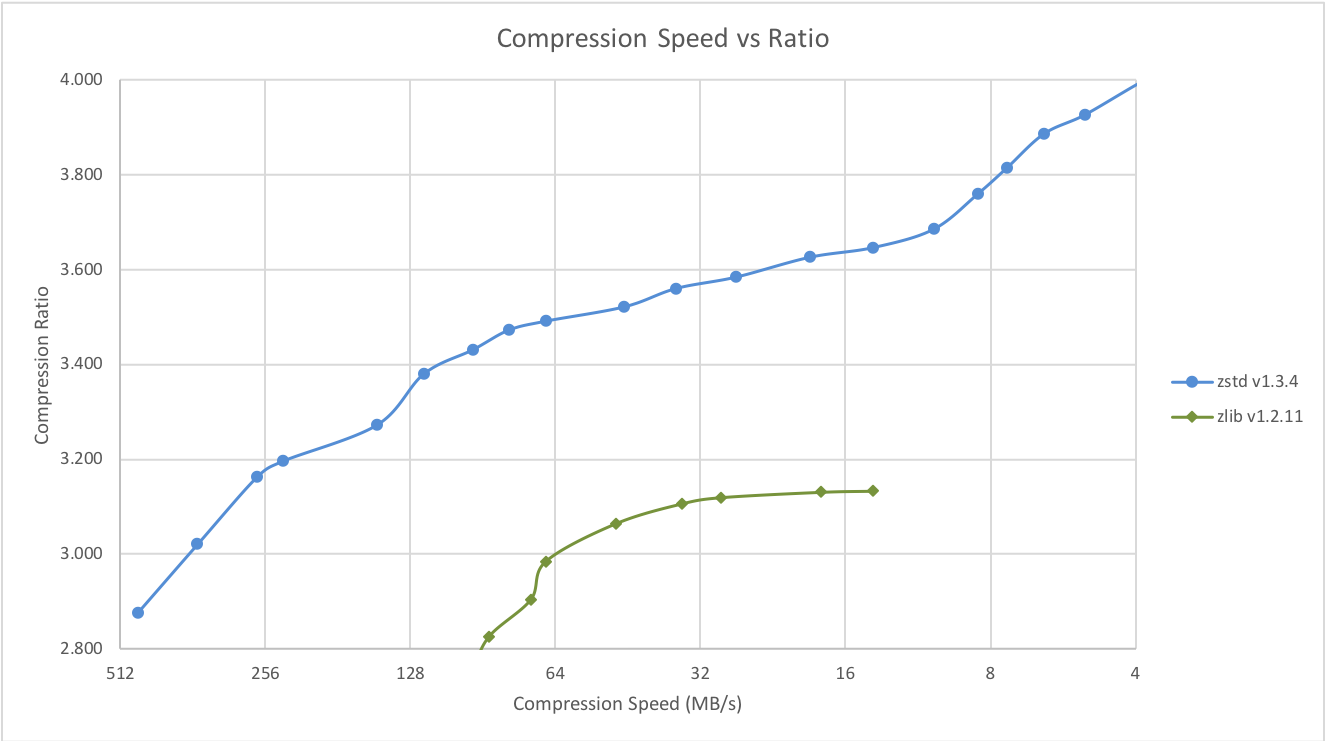 |
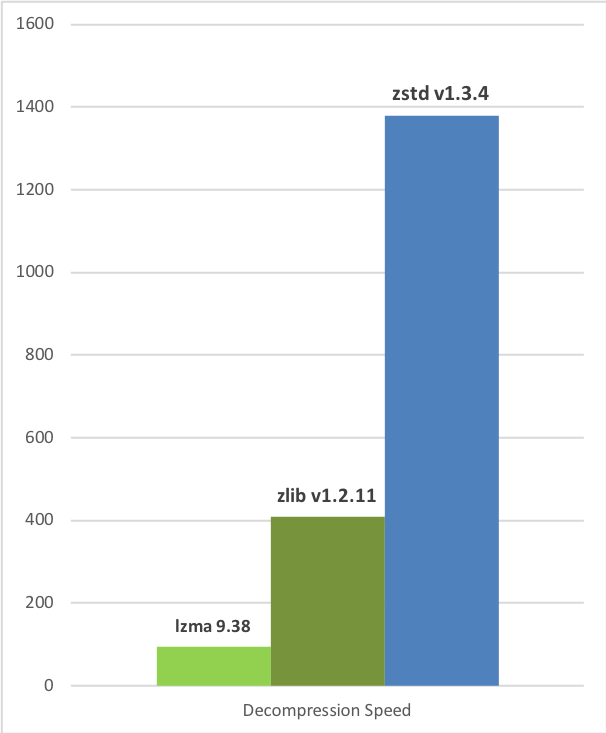 |
A few other algorithms can produce higher compression ratios at slower speeds, falling outside of the graph. For a larger picture including slow modes, click on this link.
The case for Small Data compression
Previous charts provide results applicable to typical file and stream scenarios (several MB). Small data comes with different perspectives.
The smaller the amount of data to compress, the more difficult it is to compress. This problem is common to all compression algorithms, and reason is, compression algorithms learn from past data how to compress future data. But at the beginning of a new data set, there is no "past" to build upon.
To solve this situation, Zstd offers a training mode, which can be used to tune the algorithm for a selected type of data. Training Zstandard is achieved by providing it with a few samples (one file per sample). The result of this training is stored in a file called "dictionary", which must be loaded before compression and decompression. Using this dictionary, the compression ratio achievable on small data improves dramatically.
The following example uses the github-users sample set, created from github public API.
It consists of roughly 10K records weighing about 1KB each.
| Compression Ratio | Compression Speed | Decompression Speed |
|---|---|---|
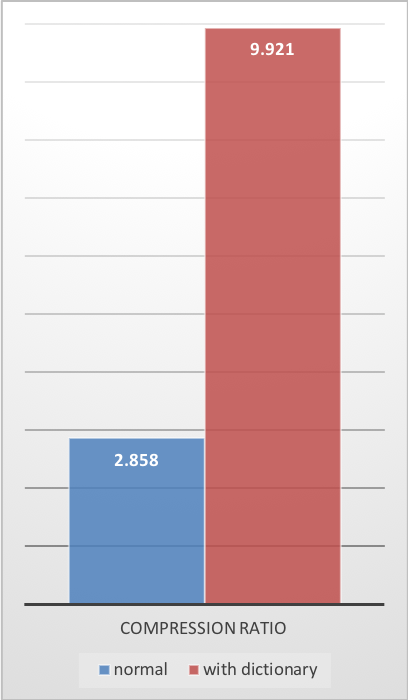 |
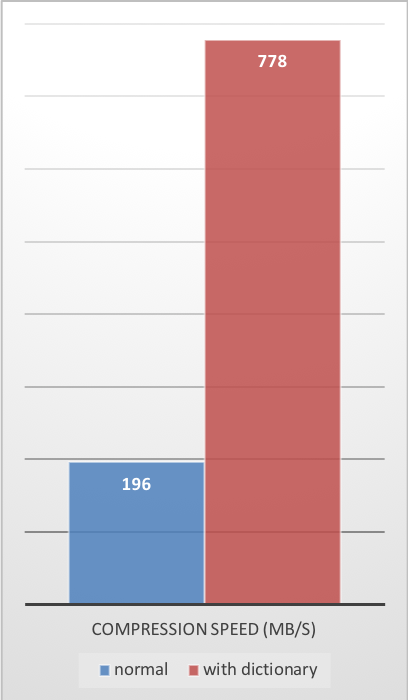 |
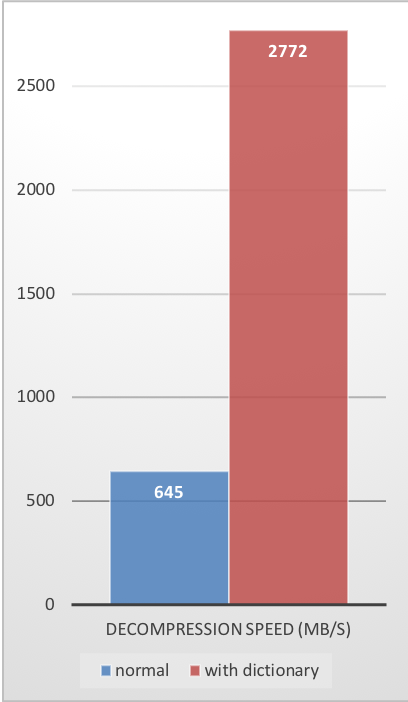 |
These compression gains are achieved while simultaneously providing faster compression and decompression speeds.
Training works if there is some correlation in a family of small data samples. The more data-specific a dictionary is, the more efficient it is (there is no universal dictionary). Hence, deploying one dictionary per type of data will provide the greatest benefits. Dictionary gains are mostly effective in the first few KB. Then, the compression algorithm will gradually use previously decoded content to better compress the rest of the file.
Dictionary compression How To:
-
Create the dictionary
zstd --train FullPathToTrainingSet/* -o dictionaryName -
Compress with dictionary
zstd -D dictionaryName FILE -
Decompress with dictionary
zstd -D dictionaryName --decompress FILE.zst
Build instructions
Makefile
If your system is compatible with standard make (or gmake),
invoking make in root directory will generate zstd cli in root directory.
Other available options include:
make install: create and install zstd cli, library and man pagesmake check: create and runzstd, tests its behavior on local platform
cmake
A cmake project generator is provided within build/cmake.
It can generate Makefiles or other build scripts
to create zstd binary, and libzstd dynamic and static libraries.
By default, CMAKE_BUILD_TYPE is set to Release.
Meson
A Meson project is provided within build/meson. Follow
build instructions in that directory.
You can also take a look at .travis.yml file for an
example about how Meson is used to build this project.
Note that default build type is release.
VCPKG
You can build and install zstd vcpkg dependency manager:
git clone https://github.com/Microsoft/vcpkg.git
cd vcpkg
./bootstrap-vcpkg.sh
./vcpkg integrate install
./vcpkg install zstd
The zstd port in vcpkg is kept up to date by Microsoft team members and community contributors. If the version is out of date, please create an issue or pull request on the vcpkg repository.
Visual Studio (Windows)
Going into build directory, you will find additional possibilities:
- Projects for Visual Studio 2005, 2008 and 2010.
- VS2010 project is compatible with VS2012, VS2013, VS2015 and VS2017.
- Automated build scripts for Visual compiler by @KrzysFR, in
build/VS_scripts, which will buildzstdcli andlibzstdlibrary without any need to open Visual Studio solution.
Buck
You can build the zstd binary via buck by executing: buck build programs:zstd from the root of the repo.
The output binary will be in buck-out/gen/programs/.
Testing
You can run quick local smoke tests by executing the playTest.sh script from the src/tests directory.
Two env variables $ZSTD_BIN and $DATAGEN_BIN are needed for the test script to locate the zstd and datagen binary.
For information on CI testing, please refer to TESTING.md
Status
Zstandard is currently deployed within Facebook. It is used continuously to compress large amounts of data in multiple formats and use cases. Zstandard is considered safe for production environments.
License
Zstandard is dual-licensed under BSD and GPLv2.
Contributing
The dev branch is the one where all contributions are merged before reaching release.
If you plan to propose a patch, please commit into the dev branch, or its own feature branch.
Direct commit to release are not permitted.
For more information, please read CONTRIBUTING.